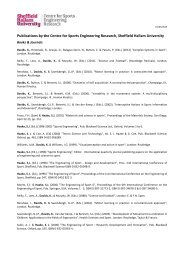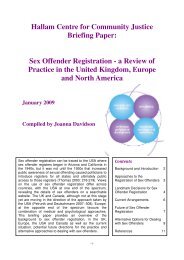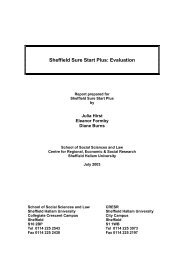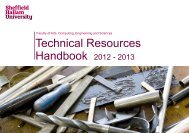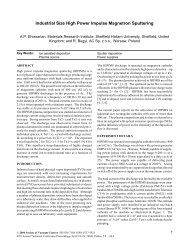The exercise of judicial discretion in rent arrears cases - Sheffield ...
The exercise of judicial discretion in rent arrears cases - Sheffield ...
The exercise of judicial discretion in rent arrears cases - Sheffield ...
Create successful ePaper yourself
Turn your PDF publications into a flip-book with our unique Google optimized e-Paper software.
or adjourn<strong>in</strong>g the application. One earlier study (Nixon et al 1996) <strong>in</strong>dicated that dismissal is<br />
rare (4% <strong>of</strong> <strong>cases</strong>), but that adjournment occurred <strong>in</strong> 26% <strong>of</strong> <strong>cases</strong>. We consider the<br />
outcomes <strong>in</strong> the <strong>cases</strong> we observed further <strong>in</strong> Chapter 3.<br />
Ground 8<br />
For hous<strong>in</strong>g association assured tenants, <strong>in</strong> addition to the <strong>discretion</strong>ary grounds 10 and 11,<br />
there is also a further mandatory ground (Ground 8) which is available where a tenant who<br />
pays <strong>rent</strong> weekly is <strong>in</strong> 8 weeks’ <strong>arrears</strong> both at the date <strong>of</strong> issue <strong>of</strong> the NSP and at the court<br />
hear<strong>in</strong>g (this figure was reduced from 13 weeks <strong>in</strong> 1997).<br />
Although the use <strong>of</strong> Ground 8 has been discouraged <strong>in</strong> the past by the Hous<strong>in</strong>g Corporation<br />
(see Chapter 8, below), Pawson et al (2005) found that a third <strong>of</strong> hous<strong>in</strong>g associations<br />
reported mak<strong>in</strong>g some use <strong>of</strong> it, although there were regional variations. In particular, half <strong>of</strong><br />
all London-based associations reported sometimes mak<strong>in</strong>g use <strong>of</strong> Ground 8.<br />
<strong>The</strong> powers <strong>of</strong> courts where Ground 8 is used have been the subject <strong>of</strong> some debate<br />
amongst judges; some believ<strong>in</strong>g they have power to adjourn <strong>cases</strong> (at least provid<strong>in</strong>g no<br />
evidence has been heard), while others consider that they have no such power. In this study<br />
we have explored the diffe<strong>rent</strong> attitudes <strong>of</strong> district judges when confronted with Ground 8<br />
claims. It may be noted that the Court <strong>of</strong> Appeal has, s<strong>in</strong>ce the <strong>in</strong>terviews and observation<br />
for this study were completed, heard and decided an appeal relat<strong>in</strong>g to the powers <strong>of</strong> the<br />
county court to adjourn possession actions <strong>in</strong> these circumstances which severely limits<br />
when adjournments may be granted (North British Hous<strong>in</strong>g Association v. Mathews [2004]<br />
EWCA Civ 1736). Decisions <strong>in</strong> <strong>cases</strong> <strong>in</strong>volv<strong>in</strong>g Ground 8 are discussed further <strong>in</strong> Chapter 8.<br />
Procedure <strong>in</strong> <strong>rent</strong> possession <strong>cases</strong><br />
As mentioned above, the process <strong>of</strong> eviction starts with the landlord issu<strong>in</strong>g a NSP. If the<br />
landlord wishes to proceed to a court action proceed<strong>in</strong>gs must be issued. <strong>The</strong> cur<strong>rent</strong> court<br />
form (N119) requires the landlord to set out details <strong>of</strong> the unpaid <strong>rent</strong>. It also asks the<br />
landlord what <strong>in</strong>formation is known about the defendant tenant’s circumstances. <strong>The</strong><br />
standard <strong>in</strong>formation requested <strong>of</strong> the landlord allows the court to establish that it has<br />
jurisdiction to decide the case.<br />
When the papers are issued the tenant will be sent a defence form (N11R) which s/he may<br />
return to the court for consideration. <strong>The</strong> form asks questions about the tenant’s <strong>in</strong>come,<br />
dependants, outgo<strong>in</strong>gs and other debts. Earlier research (Nixon et al, 1996) suggests that<br />
9



